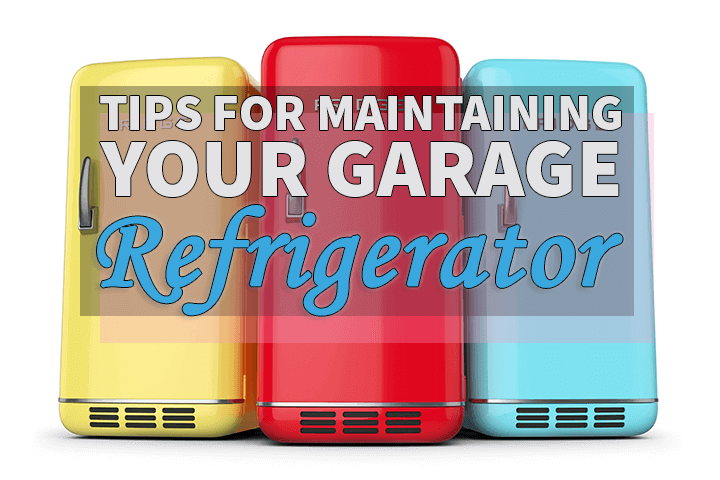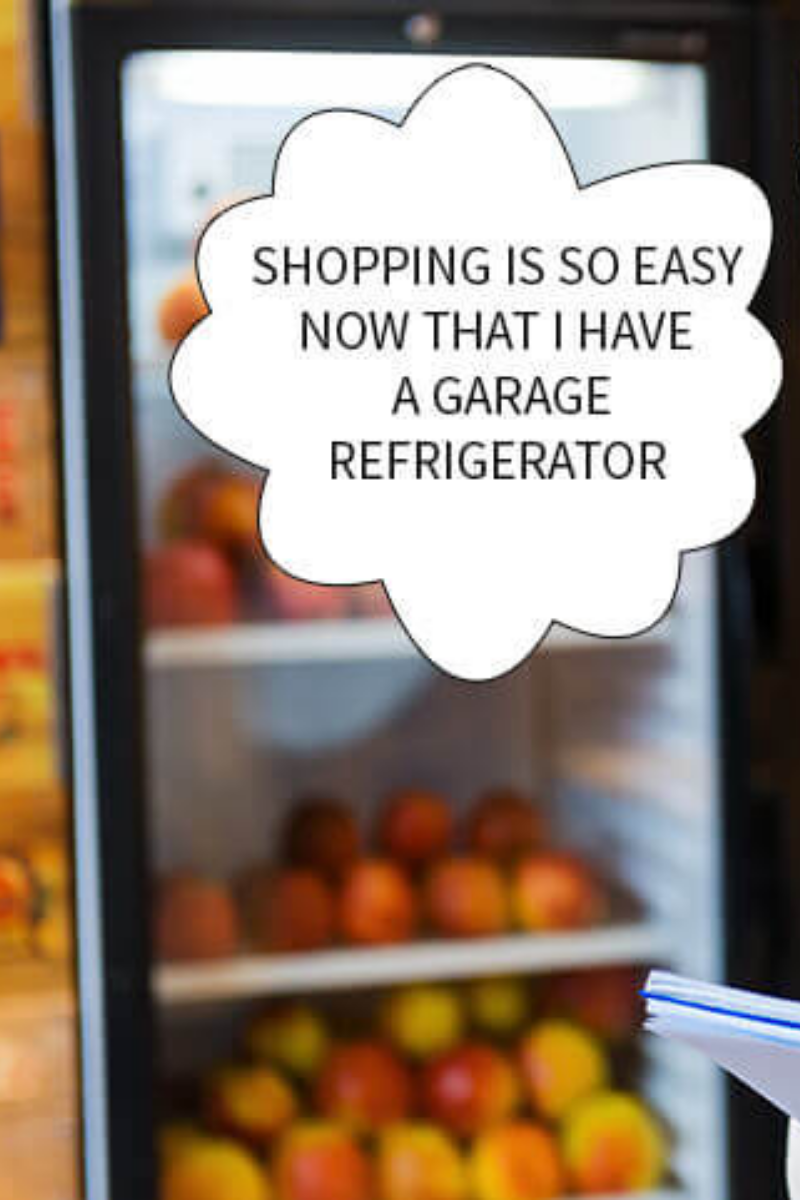
Many people install freezers or refrigerators in their garage without giving it a second thought. If it is an older model that is less sensitive to temperature changes, they may not have too many problems. The newer and more efficient models tend to be more sensitive to external temperatures.
Here are some things to think about if you want your garage fridge or freezer to last many years.
Table of Contents
What’s Wrong With a Garage Install?
The problem with installing a regular kitchen refrigerator or freezer in your garage comes about when an uninsulated garage reaches extreme temperatures. In the summer, this can cause the compressor to deteriorate and fail from the excessive run-times in scorching weather.
In the winter time, the thermostat may never turn on to cool the freezer. This may freeze the contents of items in the refrigerator section. This is because most models do not have a separate freezer thermostat.
When the refrigerator section drops below a certain point, it will simply suck the air out of the freezer unit. Some refrigerator/freezer combinations come with dual thermostats.
Check the Installation Instructions
The best method of determining if the refrigerator you are considering will work in your garage is by reading the installation instructions. In no uncertain terms, the instructions will give you the means and extremes of external operating conditions that it is approved to run in.
Although it may be possible to install a garage refrigerator kit to make any refrigerator respond properly to outside temperatures, this does not address the high-energy consumption problem in the summer. These kits aren’t expensive but require some wiring skills to manipulate the control box of your refrigerator.
It is probably a job best left for a professional if you don’t have experience with other household wirings, proper tools, or working knowledge.
Running your refrigerator outside of the suggested external temperature operating range published in the instruction manual will void the warranty.
Outdoor Refrigerators are Not Always Garage-Ready
Some refrigerators are sold as outdoor refrigerators or garage-ready. Nevertheless, because the devil is in the details, you need to find out what exactly that means. Refrigerators that are made to withstand outdoor weather may not be suited for the particular climate that you live in or may be very expensive ($1,000-$5,000).
 The advantages of the higher quality outdoor refrigerators may be more than enough for a garage. These units have beefed up compressors and components to handle the load of running longer and keeping food frozen when it is blazing hot outside.
The advantages of the higher quality outdoor refrigerators may be more than enough for a garage. These units have beefed up compressors and components to handle the load of running longer and keeping food frozen when it is blazing hot outside.
In addition, they have thicker insulation that creates a barrier to the external temperature fluctuations.
The weatherproofing and anti-corrosion features are a plus if water seeps into your garage from time to time. The UV protection is probably not a big issue if you plan on stashing your refrigerator in a garage behind walls and not panes of glass.
Alternatives for Installing a Garage Refrigerator
 Rather than beefing up the installation of your garage refrigerator by purchasing an outdoor model, you can create your own small climate-controlled room for the refrigerator.
Rather than beefing up the installation of your garage refrigerator by purchasing an outdoor model, you can create your own small climate-controlled room for the refrigerator.
You can’t simply wrap the refrigerator in insulation because it needs room to breathe, and the coils need airflow to cool off when it is running. Depending on your environment, you can build a small shed or enclosure to encapsulate your refrigerator.
You can install as much insulation as you’d like to get the room up to a stable temperature range. A simple incandescent bulb may be sufficient to raise the temperature in the winter.
Remember that the EZ Bake oven that kids used to bake cakes? It was powered by nothing more than an ordinary household incandescent light bulb. A fan blowing across the coils may be sufficient to cool it in the summer.
Garage Quirks
GFCI
Garage electricity may be wired differently. It may be based upon a ground-fault interrupter circuit (GFCI). GFCI’s were created to prevent people from being electrocuted from things like dropping a hairdryer in the sink.
The GFCI can be tripped more easily than ordinary household electrical circuits. It is designed to respond in fractions of a second for even a small 5-milliamp spike. You may not check your refrigerator every day to notice and can come home to a fridge full of spoiled foods.
Fire Hazards
Most people store cleaning items and automotive repair items in their garages. If you have gasoline for the lawn mower, oil jugs, or other flammable substances near your refrigerator, you increase the risks for lighting your garage up like a book of matches.
The coils are transferring heated refrigerant and can raise the temperature of objects in close proximity.
Power Switches
Many garages are wired for convenience and safety by having everything connected to the main light switch. If you have a switch located on the circuit of your refrigerator, you run the risk of being absentminded and flicking the switch one day instead of pulling the string on the light.
Other family members, especially kids, may not be very responsible when it comes to remembering the switch. Why take the risk? Make sure your refrigerator is properly grounded and wired correctly.
Sawdust and Debris
Many people do some woodworking projects in their garages and can accumulate a lot of sawdust and other debris. This is a potential drag on the efficiency of your refrigerator if it clings to the coils.
Always be sure to keep the coils clean and allow for sufficient operating airflow around your refrigerator.
Mold and Mildew
Unfinished garages are more susceptible to the development of mold and mildew. This can build up on the seal from external humidity condensing on the cool surface when it is hot and humid outside.
Keeping the seals of your refrigerator clean is paramount to preventing the spread of these toxins to the internal environment where they can grow even easier.
Conclusion
Now that you know why those garage refrigerators thaw out your frozen goods in the winter and drive up your electric bills in the summer, you are better equipped to prevent the damages. Whether you decide to build an enclosure to control the temperature or simply go for the convenience of a reasonably priced outdoor garage-ready appliance rated for your climate, either choice is sure to save you money down the line by avoiding burnt out refrigerators and high electric bills.
If your garage is not perfectly wired for a pricey refrigerator, it never hurts to call an electrician. The bills you pay for improvements to your property can always be kept as further evidence of its value. A fully finished garage may be an even better investment idea if you don’t do a lot of heavy work in the garage.
You might want to consider keeping your extra fridge in a basement if you have space and simply need extra storage. If you need the convenience, consider investing in a portable mini fridge or a simple cooler for those days when you are out there working and need a drink or snack.



